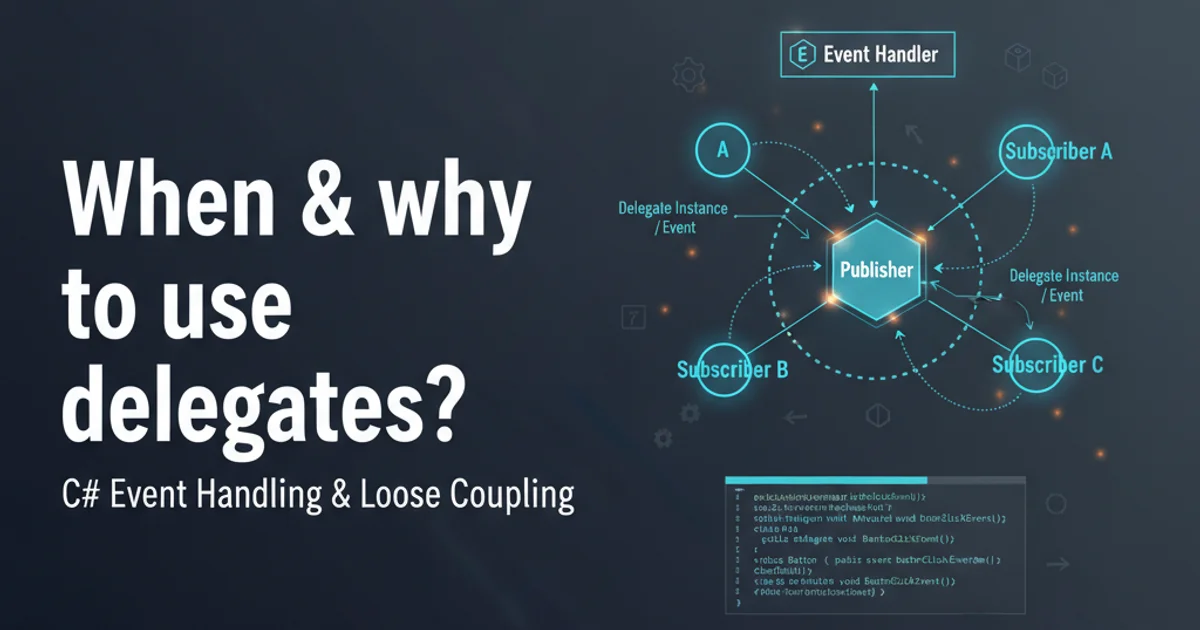When & why to use delegates?
Categories:
Mastering C# Delegates: When and Why to Use Them

Explore the power of C# delegates for flexible, extensible, and event-driven programming. Understand their core concepts, practical applications, and best practices.
Delegates are a fundamental concept in C# and the .NET framework, often described as 'type-safe function pointers.' They enable powerful programming patterns such as event handling, callbacks, and custom extensibility points. While modern C# offers alternatives like Action and Func delegates, understanding the underlying delegate keyword is crucial for grasping how these abstractions work and for maintaining older codebases.
What is a Delegate?
At its core, a delegate is a reference type that holds a reference to a method. Think of it as a contract for a method signature. Once a delegate type is defined, you can create instances of that delegate, assign methods to them (as long as the method's signature matches the delegate's signature), and then invoke the methods through the delegate instance. This allows you to pass methods as arguments, store them in data structures, and execute them at a later time, decoupling the invoker from the actual implementation.
flowchart TD
A[Define Delegate Type] --> B{Create Delegate Instance}
B --> C[Assign Method(s) to Instance]
C --> D[Invoke Delegate Instance]
D --> E[Execute Assigned Method(s)]Basic lifecycle of a C# delegate
public delegate void MyDelegate(string message);
public class Messenger
{
public void SendMessage(string msg)
{
Console.WriteLine($"Sending: {msg}");
}
public static void LogMessage(string msg)
{
Console.WriteLine($"Logging: {msg}");
}
}
public class Program
{
public static void Main(string[] args)
{
Messenger messenger = new Messenger();
// Create delegate instance and assign an instance method
MyDelegate del1 = new MyDelegate(messenger.SendMessage);
del1("Hello from instance method!");
// Assign a static method
MyDelegate del2 = Messenger.LogMessage;
del2("Hello from static method!");
// Multicast delegate
MyDelegate multicastDel = del1 + del2;
multicastDel("Hello from multicast!");
}
}
Defining and using a basic delegate in C#
When to Use Delegates
Delegates shine in scenarios where you need to achieve loose coupling, implement callback mechanisms, or build extensible systems. Here are some common use cases:
delegate is the keyword, Action<T> (for methods returning void) and Func<T, TResult> (for methods returning a value) are generic delegates provided by .NET. They cover most common delegate scenarios and reduce boilerplate code. Use them unless you need a custom delegate signature or are working with older code.1. Event Handling
This is arguably the most common and powerful use of delegates. Events in C# are built on top of delegates, providing a mechanism for objects to notify other objects (subscribers) when something interesting happens. This pattern is fundamental to UI programming, asynchronous operations, and many other architectural designs.
sequenceDiagram
participant Publisher
participant Subscriber
Publisher->>Subscriber: RegisterEventHandler(delegate)
Note over Publisher,Subscriber: Delegate stored by Publisher
Publisher->>Publisher: EventOccurs()
Publisher->>Subscriber: InvokeDelegate(eventArgs)
Subscriber->>Subscriber: HandleEvent(eventArgs)Event handling flow using delegates
public class Button
{
// Define a delegate for the event handler
public delegate void ClickEventHandler(object sender, EventArgs e);
// Define the event using the delegate
public event ClickEventHandler Click;
public void SimulateClick()
{
Console.WriteLine("Button clicked!");
// Raise the event if there are subscribers
Click?.Invoke(this, EventArgs.Empty);
}
}
public class Program
{
public static void Main(string[] args)
{
Button myButton = new Button();
// Subscribe to the Click event using a method
myButton.Click += MyButton_Click;
// Subscribe using a lambda expression (syntactic sugar for a delegate)
myButton.Click += (sender, e) => Console.WriteLine("Lambda handler triggered!");
myButton.SimulateClick();
}
private static void MyButton_Click(object sender, EventArgs e)
{
Console.WriteLine("Event handler 'MyButton_Click' triggered!");
}
}
Implementing a custom event with a delegate
2. Callbacks and Custom Extensibility
Delegates are perfect for implementing callback mechanisms, where you pass a method to another method to be executed at a specific point. This is common in asynchronous programming, custom sorting algorithms, or when providing hooks for users to inject custom logic into a framework or library.
public class DataProcessor
{
// A method that accepts a delegate (Func<T, TResult>) as a callback
public void ProcessData<T>(List<T> data, Func<T, string> formatter)
{
foreach (T item in data)
{
Console.WriteLine($"Processed: {formatter(item)}");
}
}
}
public class Program
{
public static void Main(string[] args)
{
DataProcessor processor = new DataProcessor();
List<int> numbers = new List<int> { 1, 2, 3, 4, 5 };
// Use a lambda expression (Func<int, string>) for formatting
processor.ProcessData(numbers, num => $"Number {num} squared is {num * num}");
List<string> names = new List<string> { "Alice", "Bob", "Charlie" };
// Use another lambda for string formatting
processor.ProcessData(names, name => $"Name: {name.ToUpper()}");
}
}
Using Func<T, TResult> for custom data formatting callbacks
3. Asynchronous Programming (Legacy)
Before async/await became prevalent, delegates were extensively used with the Asynchronous Programming Model (APM) pattern (e.g., BeginInvoke/EndInvoke) for executing methods on separate threads. While async/await is now the preferred approach, understanding this historical context helps in maintaining older code and appreciating the evolution of C#.
async and await over manual delegate-based threading or the APM pattern. They provide a much cleaner and safer way to handle concurrency.Why Use Delegates (Summary)
Delegates provide a powerful mechanism for achieving loose coupling and extensibility in your C# applications. They enable you to write more flexible and maintainable code by allowing you to treat methods as first-class citizens. Whether it's for event handling, custom callbacks, or building pluggable architectures, delegates are an indispensable tool in the C# developer's toolkit.
Action and Func are generic delegates that cover most common scenarios. Only define a custom delegate type if you need a specific, non-generic signature or if you're working with legacy code that already uses one.